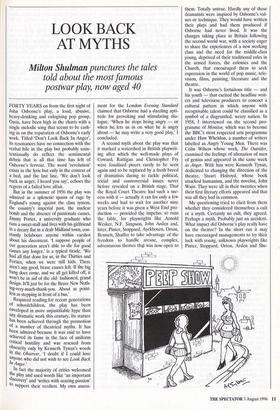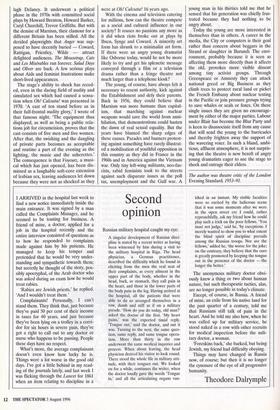LOOK BACK AT MYTHS
Milton Shulman punctures the tales told about the most famous postwar play, now aged 40 But in the summer of 1956 the play was admired as a splenetic spasm of rage by England's young against the class system, the country's imperial past, the nuclear bomb and the absence of passionate causes. Jimmy Porter, a university graduate who runs a sweet-stall and lives with his girlfriend in a dreary flat in a drab Midland town, con- stantly belabours anyone within earshot about his discontent. 'I suppose people of our generation aren't able to die for good causes any longer,' is a typical tirade. 'We had all that done for us, in the Thirties and Forties, when we were still kids. There aren't any good, brave causes left. If the big bang does come, and we all get killed off, it won't be in aid of the old- fashioned, grand design. It'll just be for the Brave New Noth- ing-very-much-thank-you. About as point- less as stepping in front of a bus.'
Required reading for recent generations Of schoolchildren, the play has been enveloped in more unjustifiable hype than any dramatic work this century. Its stature has been achieved through the promotion of a number of theatrical myths. It has been admired because it was said to have achieved its fame in the face of uniform critical hostility and was rescued from obscurity only by Kenneth Tynan's words to the Observer, 'I doubt if I could love anyone who did not wish to see Look Back In Anger.'
In fact the majority of critics welcomed the play and used words like 'an important discovery' and covery and writes with searing passion' to support their verdicts. My own assess-
ment for the London Evening Standard claimed that Osborne had a dazzling apti- tude for provoking and stimulating dia- logue. 'When he stops being angry — or when he. lets us in on what he is angry about — he may write a very good play,' I concluded.
A second myth about the play was that it marked a watershed in British playwrit- ing after which the well-made plays of Coward, Rattigan and Christopher Fry were fossilised pieces rarely to be seen again and to be replaced by a fresh breed of dramatists daring to tackle political, social and controversial issues never before revealed on a British stage. That the Royal Court Theatre had such a suc- cess with it — actually it ran for only a few weeks and had to wait for another nine years before it was given a West End pro- duction — provided the impetus, so runs the fable, for playwrights like Arnold Wesker, N.F. Simpson, John Arden and, later, Pinter, Stoppard, Ayckbourn, Orion, Bennett, Shaffer to take advantage of the freedom to handle arcane, complex, adventurous themes that was now open to them. Totally untrue. Hardly any of these dramatists were inspired by Osborne's val- ues or technique. They would have written their plays and had them produced if Osborne had never lived. It was the changes taking place in Britain following the second world war, with a society eager to share the experiences of a new working class and the need for the middle-class young, deprived of their traditional roles in the armed forces, the colonies and the Church, that encouraged them to seek expression in the world of pop music, tele- vision, films, painting, literature and the theatre.
It was Osborne's fortuitous title — and his youth — that excited the headline writ- ers and television producers to- concoct a cultural pattern in which anyone with recognisable talent could be classified as a symbol of a disgruntled, weary nation. In 1958, I interviewed on the second pro- gramme of Monitor, which was to become the BBC's most respected arts programme under Huw Wheldon, a number of writers labelled as Angry Young Men. There was Colin Wilson whose work, The Outsider, examined the feelings of alienation of men of genius and appeared in the same week as Anger. With him were Kenneth Tynan, dedicated to changing the direction of the theatre, Stuart Holroyd, whose book attacked humanism, and the novelist, John Wain. They were all in their twenties when their first literary efforts appeared and that was all they had in common.
My questioning tried to elicit from them whether they considered themselves a cult or a myth. Certainly no cult, they agreed. Perhaps a myth. Probably just an accident. What impact did Osborne's play really have on the theatre? In the short run it may have encouraged managements to try their luck with young, unknown playwrights like Pinter, Stoppard, Orton, Arden and She-
lagh Delaney. It underwent a political phase in the 1970s with committed social plays by Howard Brenton, Howard Barker, Caryl Churchill, Trevor Griffiths. But with the demise of Marxism, their clamour for a different Britain has been stilled. All the derided playwrights that Anger was sup- posed to have decently buried — Coward, Rattigan, Priestley, Wilde — attract delighted audiences. The Mousetrap, Cats and Les Mherables run forever. Salad Days and Oliver are back. A few serious plays about Aids and feminist frustrations make short-lived appearances.
The stage's ability to shock has reced- ed, even in the daring field of nudity and simulated sex which had caused a sensa- tion when Oh! Calcutta! was presented in 1970. 'A cast of ten stand before us in their full-frontal nudity glory,' I wrote of that famous night. 'The equipment thus displayed, as well as being a public rela- tions job for circumcision, proves that the cast consists of five men and five women. After that, the swishing and the dangling of private parts becomes as acceptable and routine a part of the evening as the lighting, the music and the usherettes.' The consequence is that Voyeurz, a musi- cal which has just opened, has been dis- missed as a laughable soft-core extension of lesbian sex, leaving audiences let down because they were not as shocked as they were at Oh! Calcutta! 16 years ago.
With the cinema and television catering for millions, how can the theatre compete as a social and cultural influence in our society? It rouses no passions any more as it did when riots broke out at plays by Ibsen, Synge and Coward. A minority art form has shrunk to a minimalist art form. If there were an angry young dramatist like Osborne today, would he not be more likely to try and get his splenetic message conveyed through a film or a television drama rather than a fringe theatre not much larger than a telephone kiosk?
The young, of course, have always felt it 'necessary to resent authority, kick against the Establishment and defy their parents. Back in 1956, they could believe that Marxism was more humane than capital- ism, that marching against nuclear weapons would save the world from anni- hilation, that demonstrations could hasten the dawn of real sexual equality. But the years have blunted the sharp edges of these causes. Parades and banners protest- ing against something have rarely illustrat- ed a mobilisation of youthful opposition in this country as they did in France in the 1960s and in America against the Vietnam war. Only tiny left-wing militants, neo-fas- cists, rabid feminists took to the streets against such disparate issues as the poll tax, unemployment and the Gulf war. A young man in his thirties told me that he sensed that his generation was chiefly frus- trated because they had nothing to be angry about.
Today the young are more interested in themselves than in others. A career in the media, the City or computers is their goal rather than concern about beggars in the Strand or slaughter in Burundi. The envi- ronment, probably because it is seen as affecting them more directly than it affects the old, provokes more visible dissent among tiny activist groups. Through Greenpeace or Amnesty they can attack national greed or Big Business as they climb trees to protect rural land or picket the French Embassy about nuclear testing in the Pacific or join pressure groups trying to save whales or seals or foxes. On these single issues they are given no encourage- ment by either of the major parties. Labour under Blair has become the Blur Party and is keen to disassociate itself from any cause that will send the young to the barricades and thereby frighten away the support of the wavering voter. In such a bland, ambi- tious, affluent atmosphere, it is not surpris- ing that the theatre is now bereft of angry young dramatists eager to use the stage to shock and outrage their elders.
The author was theatre critic of the London Evening Standard, 1953-91.



















































 Previous page
Previous page